“The work is not really about growing flowers; it’s about growing ourselves.”[I]
—Erin Benzakein
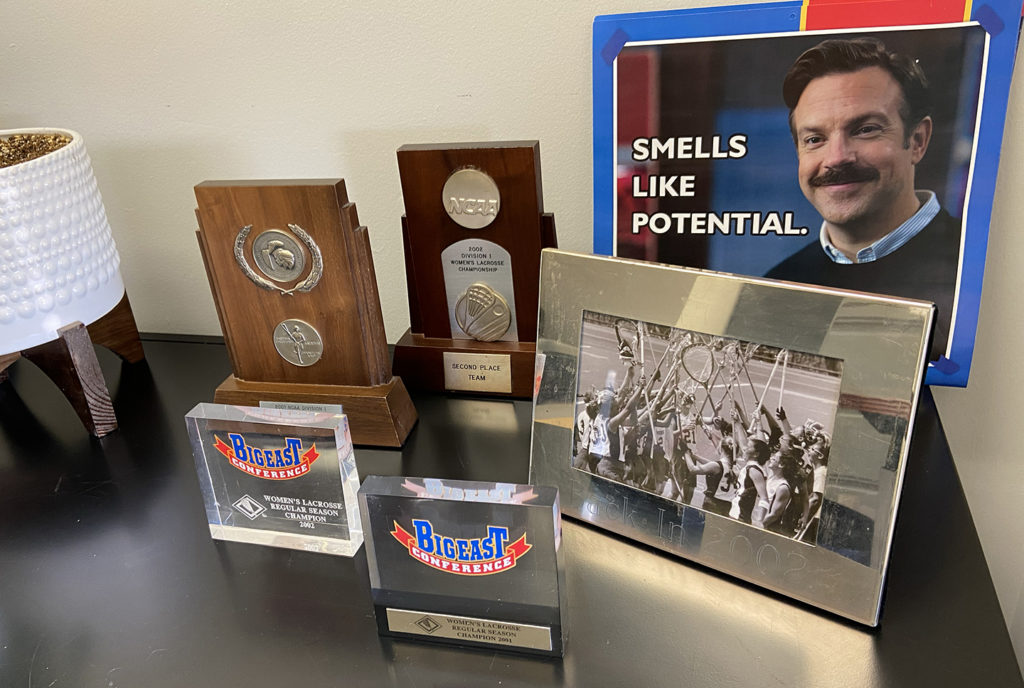
A Spark of Nostalgia
In the Season 1 finale of Ted Lasso, the titular coach faces his team in the locker room after a poignant loss. In the background, Marcus Mumford quietly sings, “You’ll Never Walk Alone,” a song originally from the musical Carousel now known widely as an anthem of sorts among soccer—or football, if you live virtually anywhere else in the world besides the United States—fans. After making a few jokes to lessen the sting, Ted gets to the real stuff. Telling everyone to lift their heads and look around the locker room, he says, “Look at everybody else in here, and I want you to be grateful that you’re going through this sad moment with all these other folks…because, I promise you, there is something worse than being sad. And that is being alone and sad. Ain’t nobody in this room alone.”[ii]
I wept uncontrollably the first time I watched that episode because I had lived a version of that speech—twice. In college, I was a goalie for the Georgetown women’s lacrosse team—a team that competed for the Division I National Championship in 2001 and 2002. We lost both times, and ever since, it’s been impossible for me to watch a championship game at any level without feeling a visceral kind of empathy toward the runners-up. Even if my team wins a Super Bowl, even if the match I’m watching is fictional, even if it’s a little-league game, my heart inevitably, instinctively, gravitates toward the second-place team. I know what it feels like to work that hard, to come that close, and to fall just short of the intended goal.
But if I’m being honest, that isn’t the primary reason Ted’s speech evoked such emotion for me. Sure, it was one of the reasons. If you aren’t the type of person who feels devastated by losing a championship, then you will likely never be in one to know what it feels like in the first place. But what really struck a nerve for me listening to Coach Lasso was the memory of being in those locker rooms during those two incredibly sad moments and being surrounded by the extraordinary women I had come to love, trust, respect, and rely on. I was not alone. And the saddest part wasn’t losing the game; it was losing them. Losing the seniors after the championship my junior year and saying goodbye to teammates and coaches the year after.
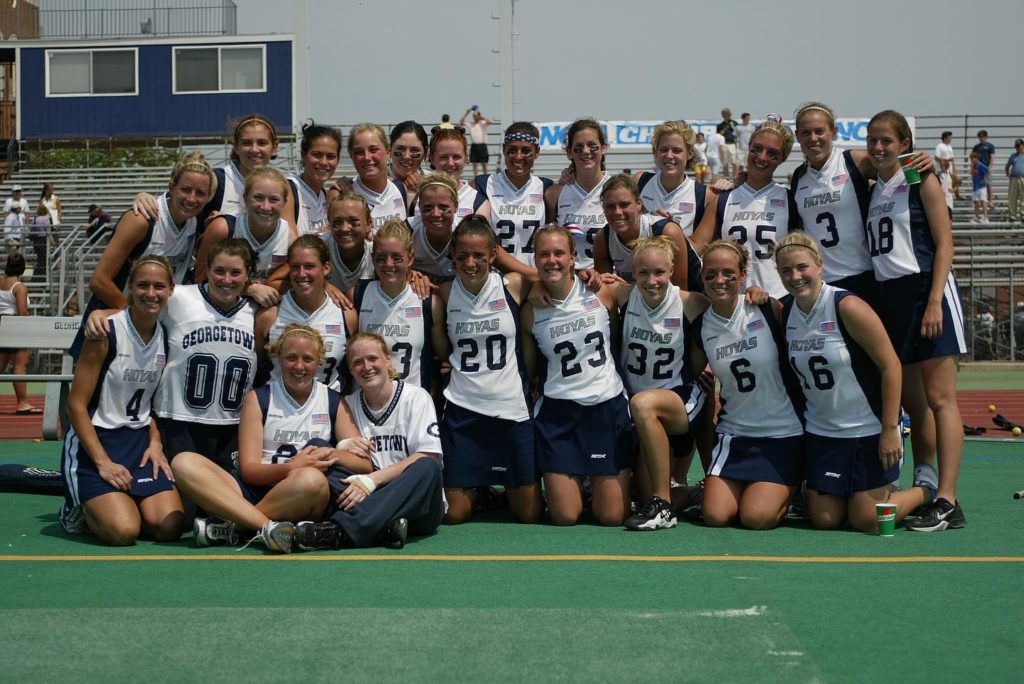
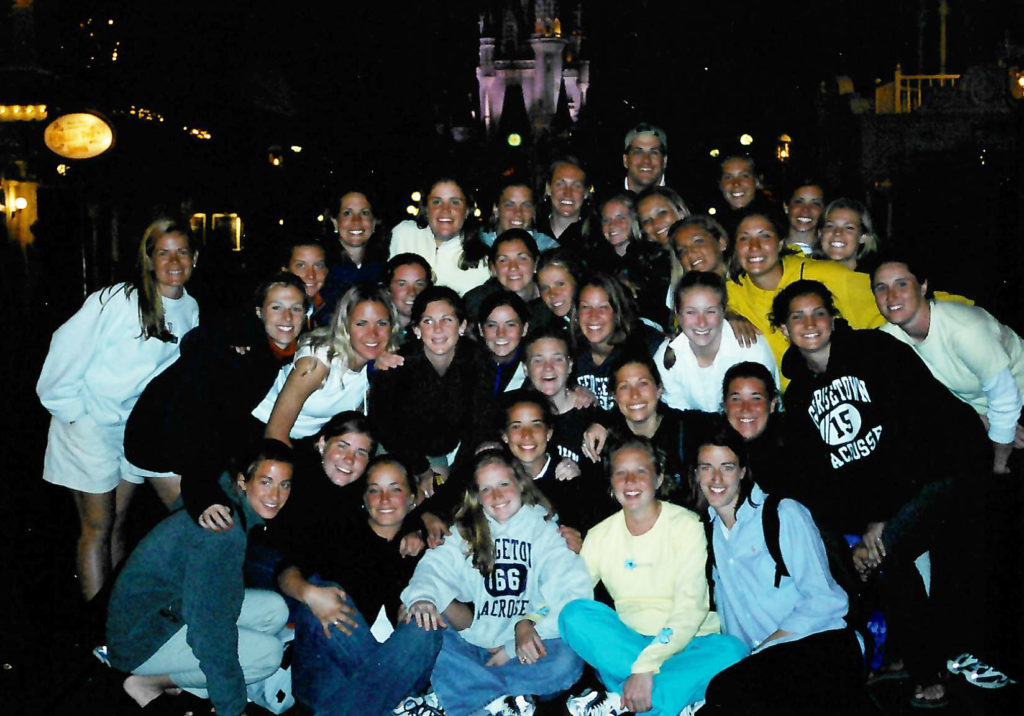
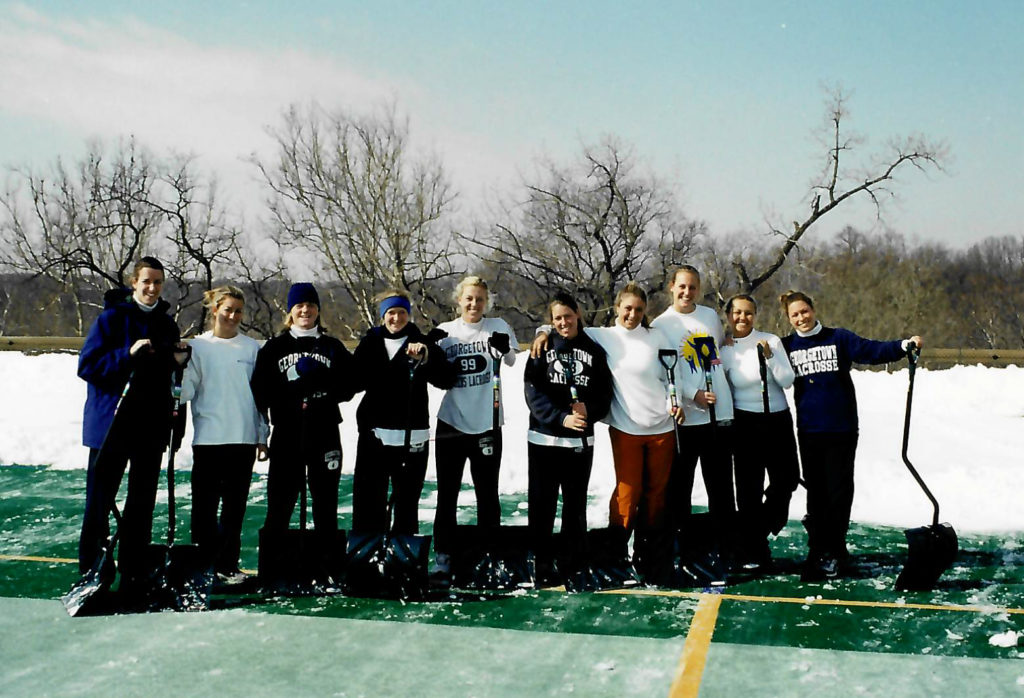
It’s hard to articulate the bond you form with your team when you play at that level. Some of the closeness comes from fun experiences and thrilling victories, but more often true strength forms through moments of adversity. Lord knows we experienced a lot of both. Over the four years that I was lucky enough to be part of it, my team formed a remarkable chemistry that couldn’t be replicated, and a lot of it began with our coaches. My head coach, Kim, definitely exhibited a little of the Lasso way, having a distinct vision of what we could be if we were willing to put aside our egos, work harder than we ever imagined and believe in ourselves and in each other.
She wasn’t exactly Ted though. There was something a little more Machiavellian about her style—often eliciting love and fear, simultaneously. She didn’t dole out compliments like a street-corner evangelist handing out religious pamphlets. You had to earn them. And even when you did, often her delivery more closely resembled an F-bomb-dropping Roy Kent approach than a Ted one. But what she lacked in relentless optimism she made up for in belief and a genuine understanding of how to instill that belief in others.
***
On a sunny September afternoon my sophomore year, I was on the turf warming up with our assistant coach, Kellie. It was a one-on-one practice we called an “extra session,” a time outside of team practice where you could work on specialized skills with a coach either by yourself or with a small group of teammates. While Kellie and I focused on drills, I noticed Kim out of the corner of my eye coming toward us. Her walk was so deliberate, I found myself wondering what I did wrong as she approached. When she got a few feet away from me, she delivered the message she came to convey: “Chandy,” she said, “In all my years of coaching, you’ve improved more in a shorter amount of time than just about any player I’ve ever encountered.”
I looked at her dumbfounded trying to process the words coming out of her mouth and then glanced at Kellie to see if maybe I was hallucinating. But Kellie’s eyes were popped wide open, and her expression of confused excitement silently confirmed she had heard the same words I had. Then, before I had time to react, and as quickly and methodically as she had charged toward us, Kim turned and walked away. When she reached the twenty-yard line, she stopped abruptly, spun back around, and yelled, “Now don’t fuck it up and start playing like shit!”
Ah, there it is, I thought, breaking into a colossal case of the giggles. For some, that second statement might have diminished the power of the first, but for me, it only reinforced it. I knew the compliment was real because of the follow-up caveat that came along with it. You’ve done something impressive and worthy of my acknowledgment, she was saying. But we’ve only scratched the surface of your capabilities, so get back to work. Outside of that time at an Allman Brothers concert in nineteen-ninety-something when my brother told me he loved me more than beer, it might be my favorite thing anyone has said to me.
Staying Curious
So many tough and beautiful memories floated back to me while spending time with Ted and his Richmond team, but I was captivated by more than just nostalgia. Released during a global pandemic, the show’s timing couldn’t have been more fortuitous. When the world was experiencing a collective and unparalleled level of fear, anxiety, tragedy, and stress, when tempers became short and patience ran low, along came a show packed with kindness, joy, and acceptance.
What the hell, right?
And like so many others hungry for an uplifting escape in 2020, I devoured Ted Lasso, one episode after another, until I was stuffed. More than just a lovely reminder of my life two decades ago, the show stuck to my ribs with its serendipitous messages of hope and realizing your potential. It jiggled something loose, touched something bigger and deeper in me, and I fell down a rabbit hole investigating why.
I think part of it has something to do with Mr. Rogers. You know, the really sweet, neighborly guy who spent over thirty years telling us daily how much he likes us, just the way we are. Some of my earliest memories are of watching him walk through the door, singing and smiling, and swapping out his formal jacket and work shoes for a comfy zip-up sweater knitted by his mom and a pair of navy-blue sneakers just like mine. Day after day, he spent time with us, asked us how we were doing, and gave us permission to be a perfectly imperfect version of ourselves. He knew little people had big emotions, and he taught us how to recognize and deal with them.
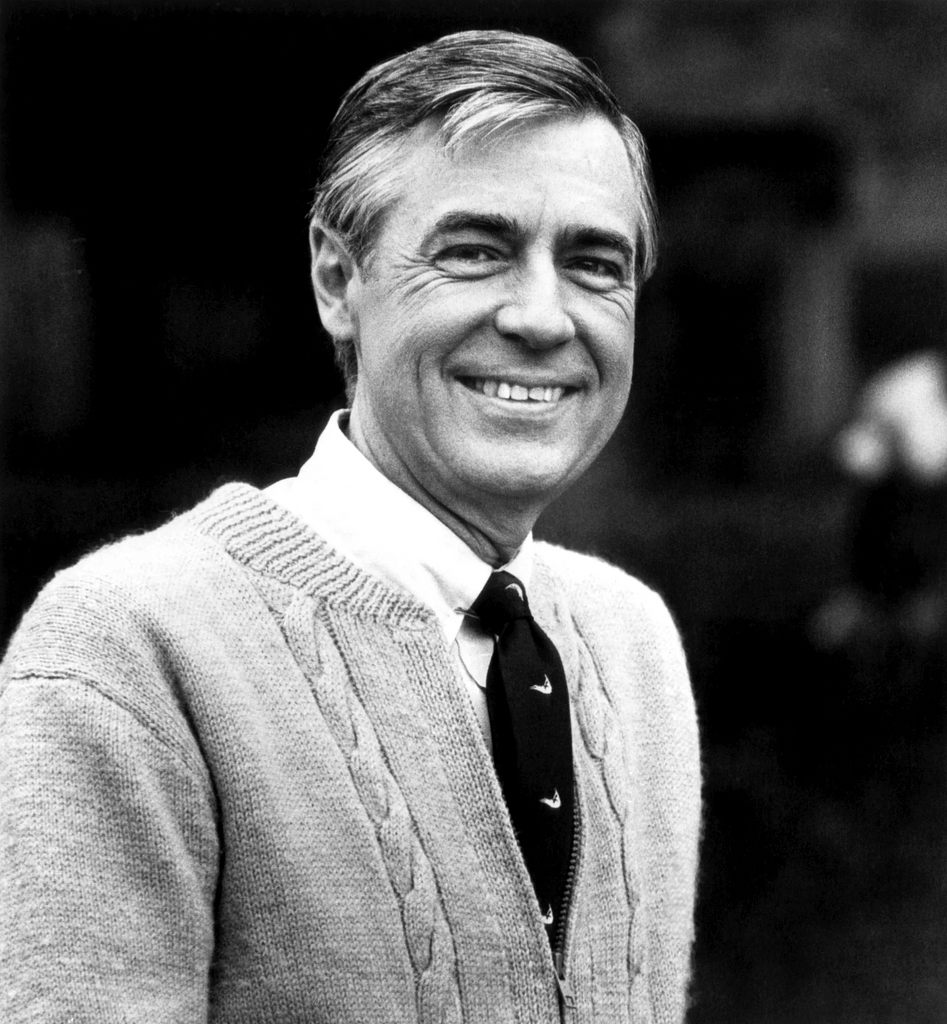
Everyone was welcome in Mister Rogers’ neighborhood, and he made sure we knew it. He visited with blind musicians, kids in wheelchairs, adults on crutches, and people of all colors and backgrounds. Performing his own version of a magic trick, every day he found new ways to show us how each person is distinctly beautiful, uniquely talented, and somehow just like us at the same time.
Perhaps one of the reasons I fell so hard, so fast, for Ted Lasso is because he embodies so many of the feel-good attributes of Fred Rogers: unabashedly himself, quick to accept and forgive others, a ceaseless teacher and learner in all life experiences, and a preacher of belief—in yourself (even if you’re a ghost), in each other, and in the unmistakable power of combining the two.
Just like Mister Rogers, Ted seems to know how to perform a little magic, too. In my very favorite trick of the first season, he shows how it’s possible to flip someone off without using your middle finger. Instead, he enlists his whole hand (both of them actually) to win a dart game against a first-class A-hole. And adding compliment—rather than insult—to injury, he does it all the while giving a lesson on the danger of underestimating people and the vital importance of living with a sense of curiosity rather than judgment.
Mister Rogers devoted countless episodes to curiosity as an invaluable learning tool—not only to help us figure out what we like and are good at, but especially to help us better understand other people. He also covered ways to manage our anger by illustrating the myriad ways we could use our hands to work out aggression without hurting ourselves or anyone else:
playing with sand
kneading dough
playing games
working with puppets
molding clay
finger painting
building with blocks
cooking
clapping
holding a book
I mean, he really made sure we knew all our options that didn’t involve punching someone in the face. I can’t help but think he’d not only admire Ted’s heartfelt speech about seeking to understand people, but also enthusiastically add “throwing darts” to his approved list of hand-related anger-diffusers.
Mister Rogers never expected perfection—from any of us or even from himself. Quite the opposite. He emphasized over and over that if we have a pulse, we are living, breathing mistake-makers, and he often kept going when there was a little mishap in filming. If he didn’t get it right the first time, he wanted his neighbors to know he had to practice, too. He told us that all good people sometimes do bad things, and he even debunked the myth that Santa Claus is like a CIA operative with twenty-four-hour access to our whereabouts. Elf on a Shelf, beware.
I imagine maybe Ted watched the Santa episode (#1261) from 1972 when he was little, because it sure seems like he accepts the innate flaws that make us unmistakably human. And rather than feeling resentment and judgment toward a person who tries to sabotage him, he offers instant forgiveness and empathy. He understands that going through a traumatic life experience like divorce might make a person act irrationally out of grief and pain.
Before anyone gets to judging my mental fitness, I feel the need to state I understand Ted Lasso is a fictional character despite mounting evidence to the contrary. Maybe a teeny, tiny part of me believes in him the same way a nine-year-old believes in Santa Claus—approaching the realization that he’s likely made up but secretly hoping he, or someone just like him, really exists out there in the world.
As an American football coach more or less impersonating a European gaffer, Ted, like so many of us, might have also learned from Mister Rogers that pretending can be one of the best ways to “try out life” and see what feels good. Looking back as an adult, I realize I paid way more attention to some segments of Mister Rogers’ Neighborhood compared to others, because I don’t often exhibit emotion, unless I’m watching a sports movie—which is its own brand of weird best saved for another day—but my closet houses at least half a dozen identical cardigans in different colors, I enthusiastically change into comfy clothes the second I get home, and I also haven’t lost my knack for pretending.
***
When we found ourselves suddenly, unceremoniously extricated from precedented times in 2020, I pretended I was a florist. It started small, purchasing little bouquets for myself at Trader Joe’s. If I was going to be trapped at home indefinitely, I could at least surround myself with something beautiful. I had read somewhere that if you wanted to find purpose, you should do something that brings you joy. I realized flowers brought me joy, so I kept buying them. What I also realized is that gorgeously arranged flowers brought me joy, but I didn’t have a clue how to reach that end product, so, for quite a while, flowers also brought me frustration. Although I lacked the knowledge to artfully arrange them, I was curious and open to learning, so I started researching, reading articles, and looking at books on floral design. When I came across flower farmer-florist Erin Benzakein, I knew I had found a good teacher. As co-owner of Floret Flower Farm in the Skagit Valley of Washington, she has become one of the foremost authorities in every floriated facet you can imagine.
But what sets her apart from most other farmers out there is that, sort of like Mister Rogers, she values uniqueness over uniformity. Instead of getting rid of flowers that veer from the norm, she seeks them out, detecting these exceptional little floral beings hiding among the average ones, marking them to save, and sending their seeds out into the world so that more people can enjoy their exquisiteness.
Before I knew much about Benzakein’s journey, what originally drew me to her was how she began: with a humble garden in her back yard and tears of frustration in her shed when arranging didn’t come naturally. It felt validating to hear that someone who is now an expert once experienced the same struggle I was going through. Years of trial and error eventually taught her that success hinges on using the right tools and methods, and once she discovered what they were, she wanted to save others like me from the same frustrated fate by writing and publishing books containing her secrets.
A few months into the pandemic, a dear friend of mine got married in her front yard. It was never meant to be a large wedding, but it wasn’t supposed to be a microscopic one either. COVID-19 changed that. She didn’t want to postpone indefinitely, so she and her fiancé decided to move forward with a ceremony on their lawn, even if only immediate family could attend. When she said there would be hardly any people, no frills, and no flowers, I knew I might be able to remedy at least one of those issues. I asked her to let me provide flowers for the occasion—nothing too fancy, just a little bit of loveliness to remind her the day is still special, albeit not quite how she imagined.
When she agreed to let me make some bouquets and boutonnieres, I had a moment of panic. It wasn’t that I didn’t want to make them; it’s that I was a recovering perfectionist signing on to do a task I hadn’t yet mastered, let alone done—ever. Luckily, I had two positives working for me: First, this was a gift. I wasn’t being hired by someone who could claim the final product wasn’t what they ordered. Not-the-best flowers would trump no flowers. And second, I had YouTube. Even though text and photos can teach you a great many things, there is something about watching a skill unfold in real time that makes even the most daunting concept more accessible. Especially where the boutonnieres were concerned, seeing the process broken down into steps made the result attainable.
Several hours, countless videos, and a few shopping trips later, I had a legitimate bridal bouquet, two bridesmaid bouquets, a handful of boutonnieres, and a table centerpiece. And what I realized when I dropped them off is that, even though my arrangements weren’t what I would call masterful, they didn’t need to be. They would fulfill their purpose. They would signal to the few people gathered on the lawn, and others watching on Zoom, that this day was special. They would serve as a reminder to my friend that, although I couldn’t be there, I was still present, and she was surrounded by that love. The point of flowers is to add beauty, not perfection, to the world. And more than any aesthetically pleasing ornamentation they provide, they also convey emotion, evoke memories, and whisper words of support without speaking. I knew how much better flowers made me feel, but now I was bearing witness to the transformative power of giving them away.
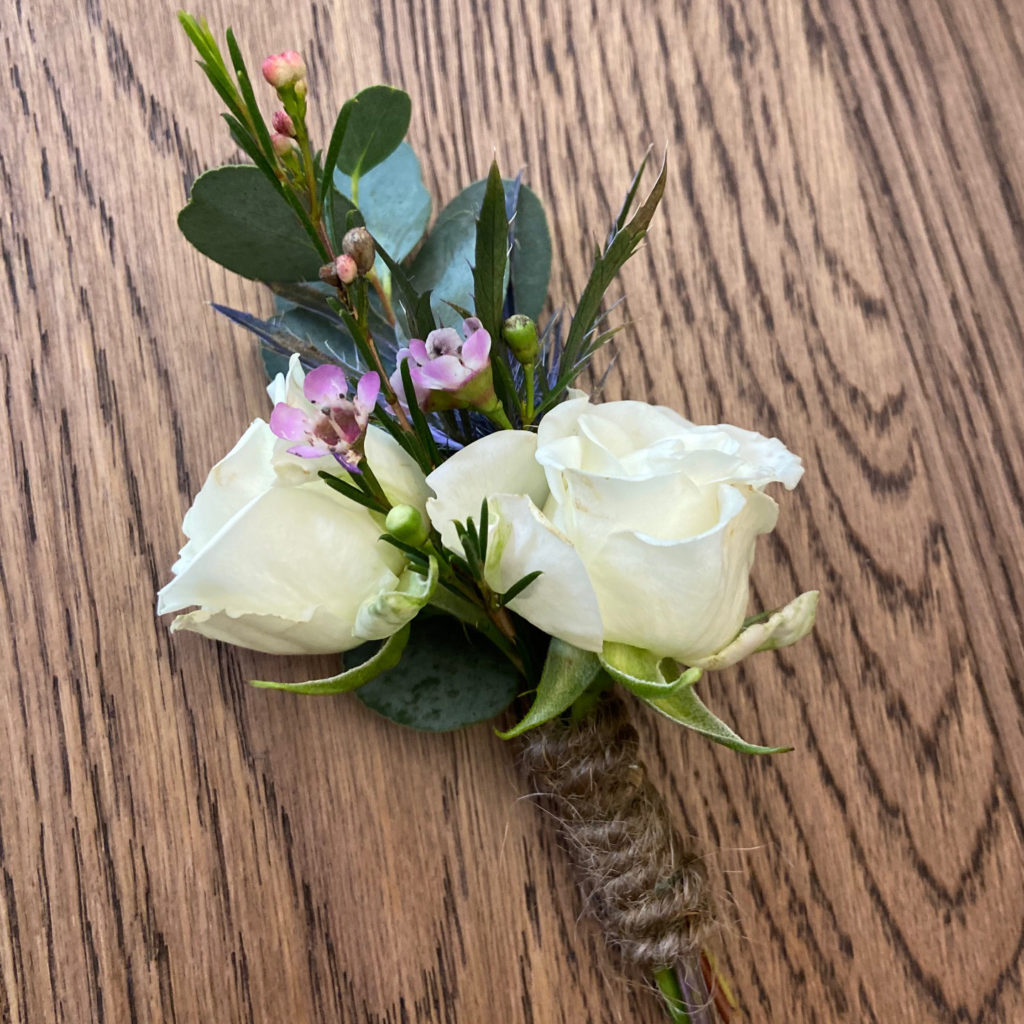
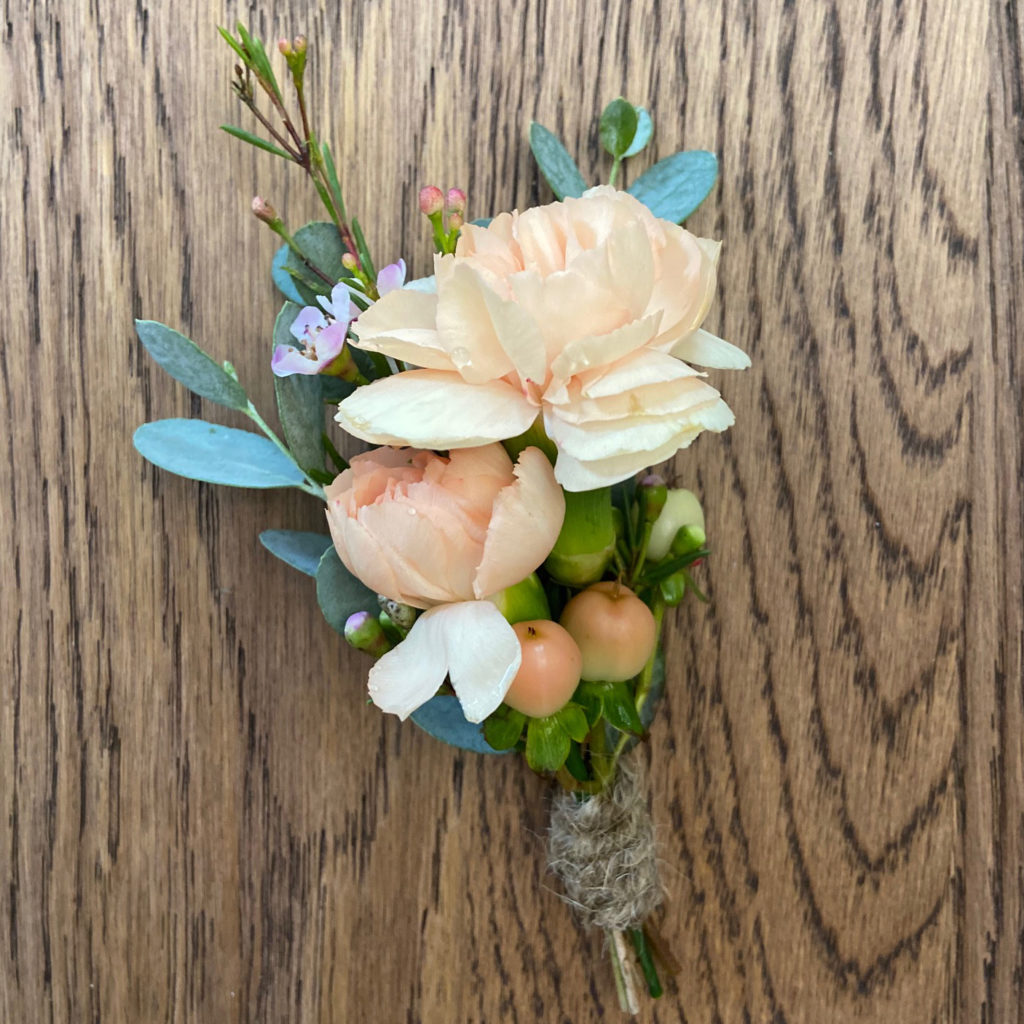
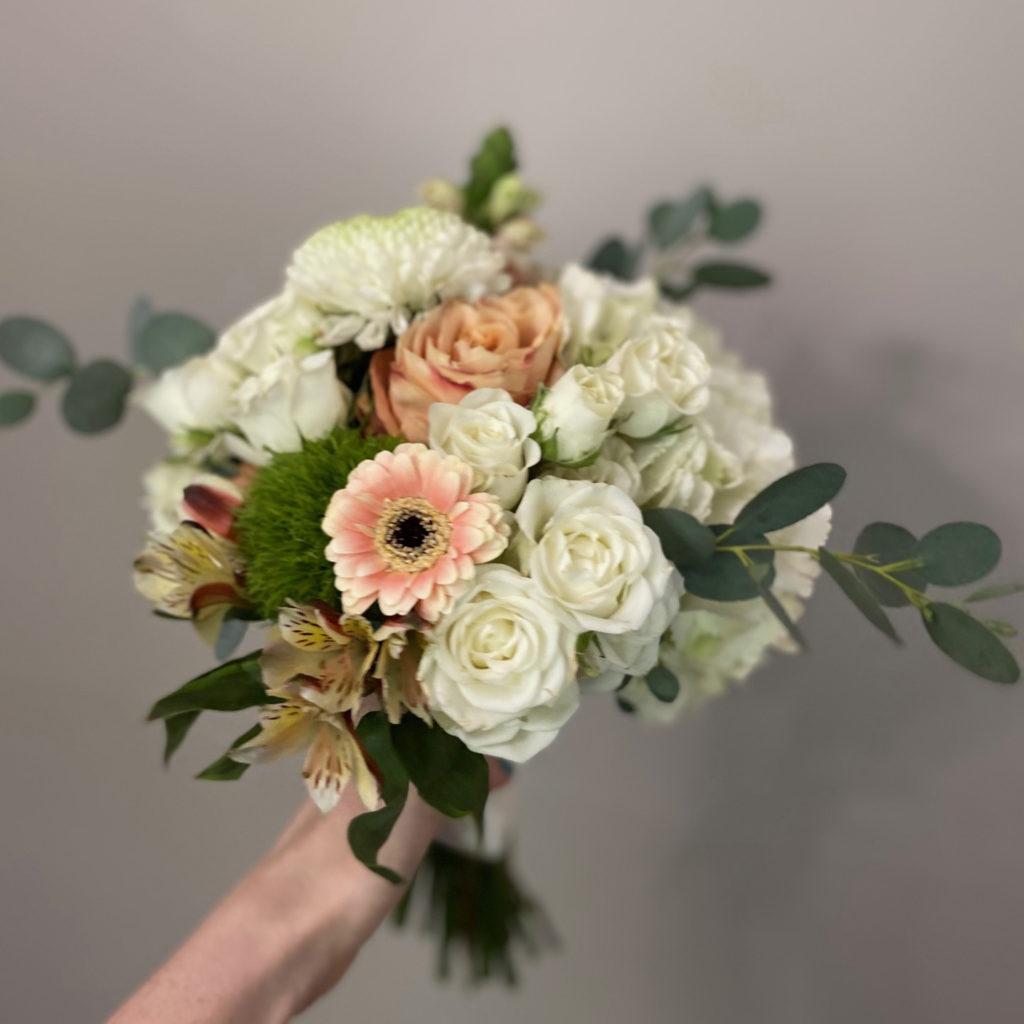
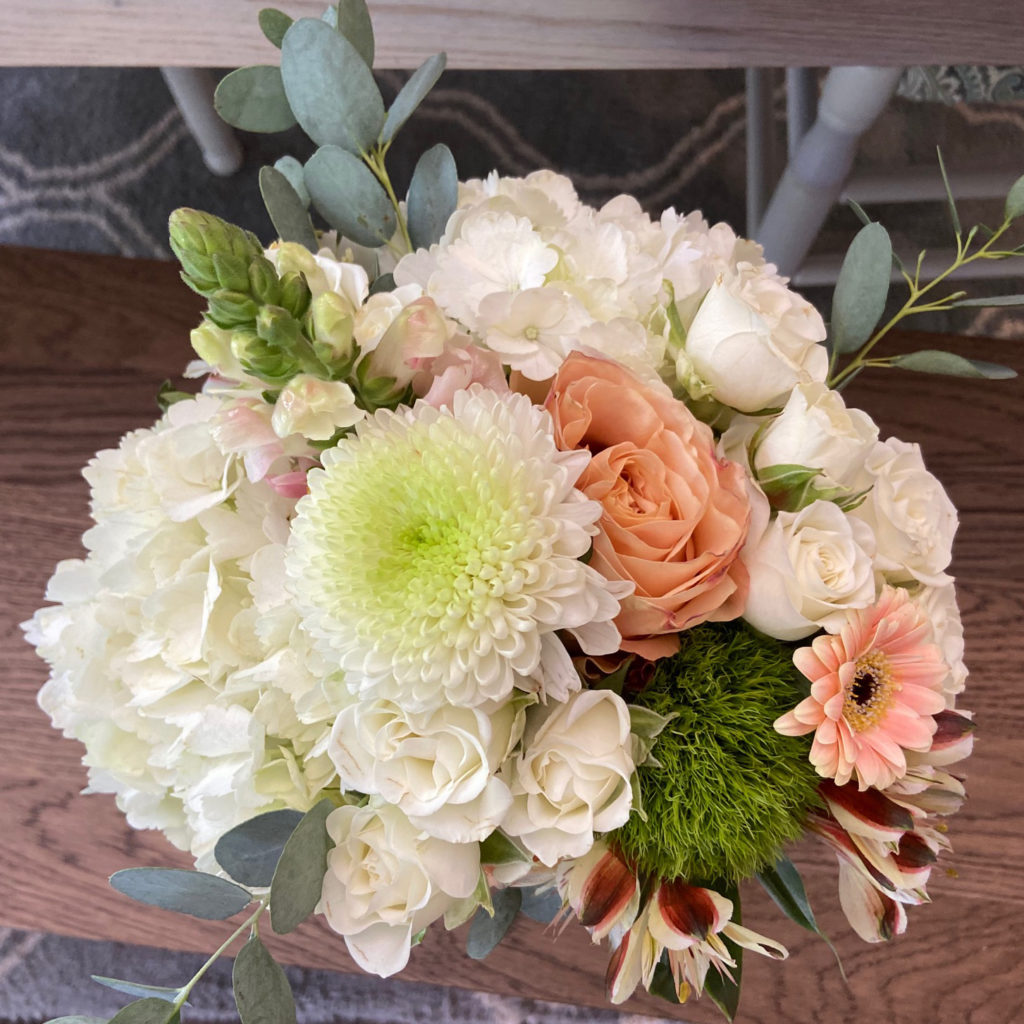
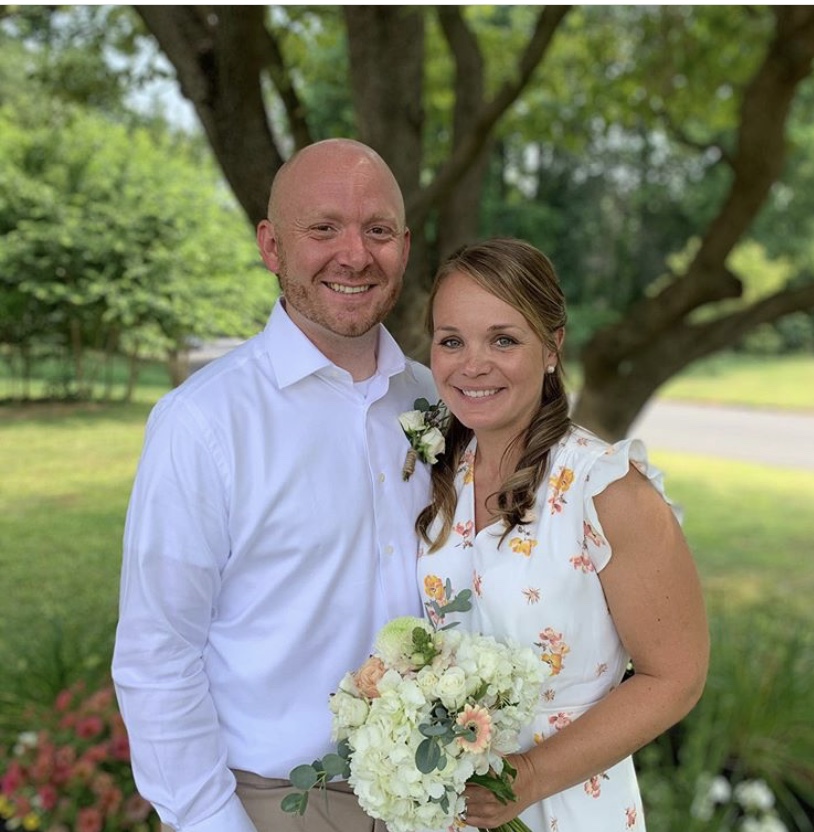
As Thanksgiving approached months later, the upcoming holiday season didn’t seem to hold the same level of excited anticipation for people it normally did. We continued to be in a state of lockdown, and because most experts agreed it was still unsafe to hold large indoor gatherings, almost everyone I knew was planning a minimalist dinner with immediate family, celebrating severely abridged versions of the traditions to which they were accustomed. Knowing the ability of flowers to elevate surroundings and spirits, I thought making flower arrangements more widely available to friends might help the holidays feel festive, despite the season’s inevitable shortcomings. I was still learning by trial and error, but I was getting much better, and I felt confident in my abilities to provide pretty enough arrangements at affordable, pretend florist prices. Referring to myself as the Late Bloomer Flower Company, I posted on my Facebook page, offering to make arrangements in a variety of sizes to be delivered locally.
A few days and twenty-three arrangements later, I had to cut off ordering for fear I wouldn’t be able to handle the volume if I allowed any more. The days leading up to Thanksgiving were a bit of a whirlwind. My kitchen became a floral shop filled to the brim with buckets and blooms. And as I worked on each arrangement, I tried to think of the person it was going to. When I felt myself getting anxious because it wasn’t yet what I hoped it would be, I tried to remind myself of the point: distributing joy through beauty, not perfection. Although I faced many moments of struggle, frustration, tears, and exhaustion during the days leading up to Thanksgiving, I also came away feeling like I had made an earnest offering, and once every last arrangement had been delivered to its grateful recipient, I noticed maybe I wasn’t a pretend florist anymore. Perhaps I had inadvertently become a real one.
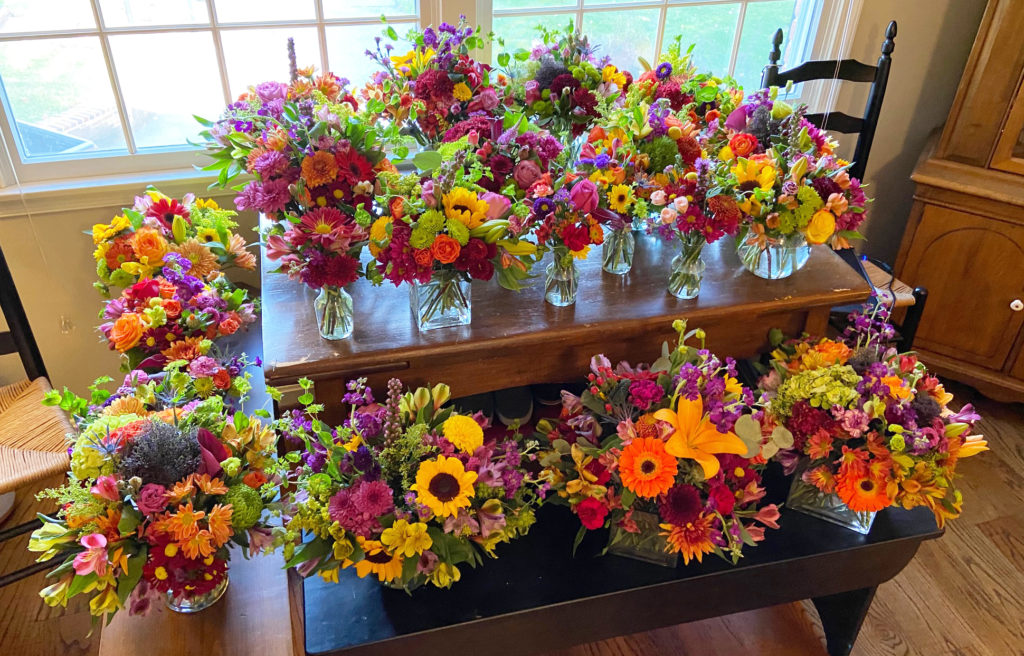
I still consider it a hobby far more than a hustle, but since that first little foray in wedding flowers, I’ve made arrangements for several major holidays, a wedding rehearsal, two funeral receptions, work functions, a bridal shower, and several birthday parties and anniversaries in between. Proof that you really can try out life by pretending, often discovering what you’re good at (and what you’re not), and you can find purpose simply by leaning harder into joy.
Finding Purpose
Mister Rogers often helped us discover more about ourselves by introducing us to someone else. In 1992, he took us to the library to meet his friend Eric Kloss—an American jazz saxophonist who was born blind—to show us how he uses a special machine to read books aloud. Together, they listened to the machine read the poem “Be the Best of Whatever You Are” by Douglas Malloch:
If you can’t be a pine on the top of the hill,
Be a scrub in the valley — but be
The best little scrub by the side of the rill;
Be a bush if you can’t be a tree.
If you can’t be a bush be a bit of the grass,
And some highway happier make;
If you can’t be a muskie then just be a bass —
But the liveliest bass in the lake!
We can’t all be captains, we’ve got to be crew,
There’s something for all of us here,
There’s big work to do, and there’s lesser to do,
And the task you must do is the near.
If you can’t be a highway then just be a trail,
If you can’t be the sun be a star;
It isn’t by size that you win or you fail —
Be the best of whatever you are![iii]
I see what he did there. We all have different purposes and varying abilities. It’s our job to figure out what we can do, what makes us unique, and how we can use our gifts to help others. It’s our obligation to fully embrace who we are and be the very best version of that, whatever it is.
I can feel that poem, especially when I think about my collegiate lacrosse career. I had my sights set on starting my freshman year, since the team’s only goalie had graduated the previous spring. My plan adjusted when we got a sophomore midyear transfer that winter. It’s hard to distill my relationship with Bowen down to a sentence, but I often jokingly refer to her as the greatest gift I never wanted. My biggest competition and the most immediate threat to my playing time, we both tried to ignore each other for a while before our coach explained to us that wasn’t an option. “Come here, both of you,” I recall Kellie saying. “I understand you’re fighting for the same position. And I’m not saying you have to be best friends off the field, but on this field, you are teammates. You will cheer for each other. You will support each other. Am I clear?”
Although it was completely forced at first, I remember that we began cheering for each other that day. We were doing it purely out of obligation because we were told to, but it didn’t take long for the support to turn genuine. Three weeks later, Bowen was the one consoling me after a terrible preseason game, two years later I was the one consoling her when she tore her ACL in the middle of her senior season, and in the space in between, we filled a forty-four-page scrapbook with photos and memories and late-night emails. She was the only other person who experienced many of my same struggles and understood certain frustrations, like coaches yelling, “Just step in front of the ball” after a goal was scored or “It wouldn’t hurt so much if you got your stick there” after getting pegged with a shot at practice. I think sometimes our coaches purposely assumed the role of villain so that we would have an opportunity to play hero for each other.
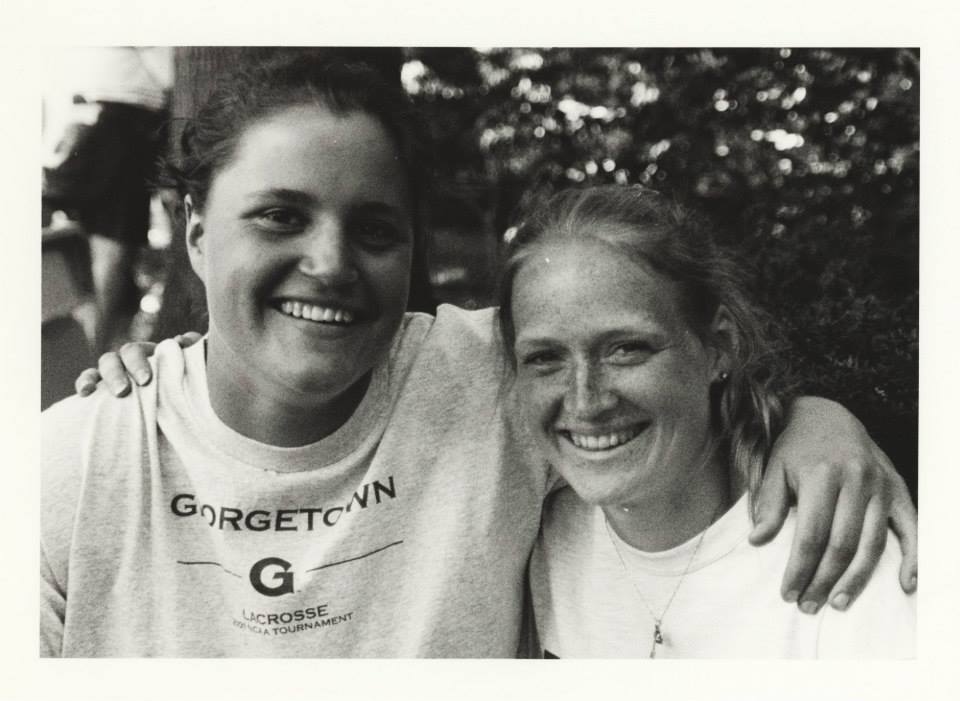
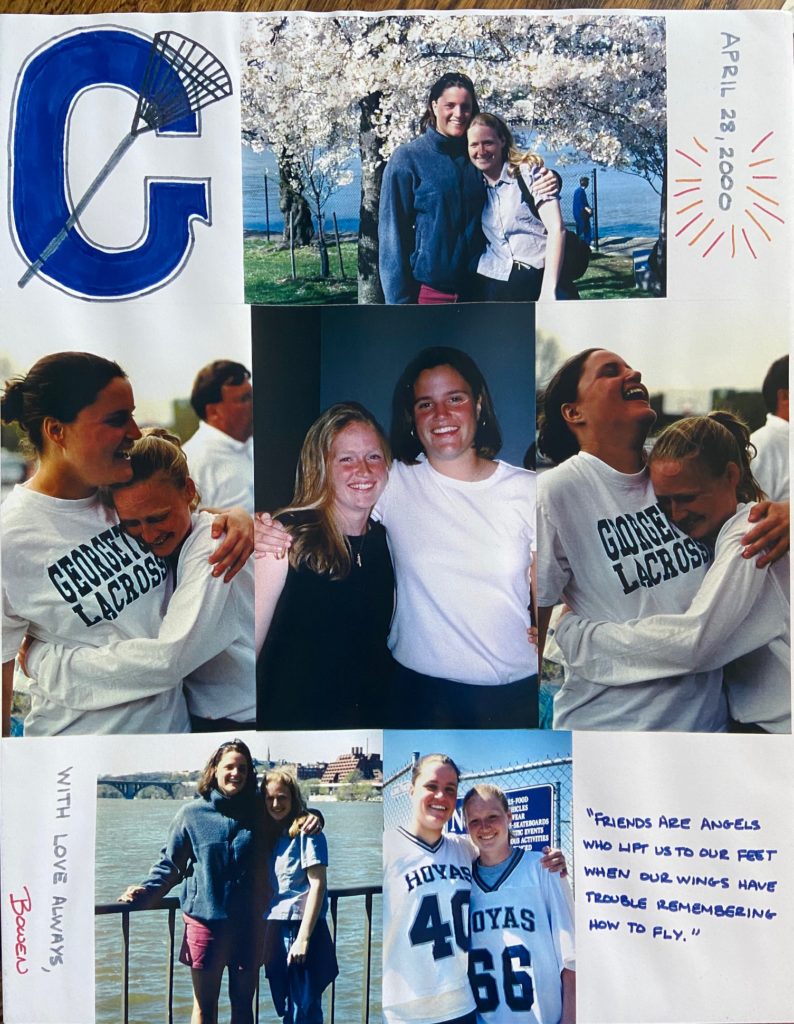
Bowen won the starting spot, eventually becoming an All-American and Hall of Famer, and I took on the role of backup. But it was in that position that I became the best version of myself. I worked harder than I would have otherwise. I made sure that if I wasn’t the one starting, the person who was had earned it and was prepared. Had Bowen not arrived, I would have missed out on a lot of free therapy, and I probably would have been a mediocre starter, at least at the beginning. Without someone pushing me to become better (and believing wholeheartedly that I could), I don’t know that I would have improved so much so quickly. I don’t think Kim would have paid me the compliment she did the following fall.
It took a while for me to understand that everyone has an individual role to play, and that although they aren’t equally glamourous, they are equally important. Being a good backup keeper required a special kind of disposition. You had to be ready to go in at a moment’s notice yet faced with the reality that most likely you wouldn’t. Not many people, especially players in a top Division 1 program, want that job.
There were times I grappled with it, but something shifted for me during spring my sophomore season. One morning before lifting weights, I went into Kellie’s office. She really was a Ted Lasso figure for me—a one-woman Diamond Dogs[iv] of sorts, offering support and solutions from the day I set foot on campus. She was the one who helped me find a tutor when I accidentally wound up in pre-med bio class. She was the one who left encouraging messages on my answering machine (yes, it was an actual machine attached to my home phone, the only phone I had, and I could only listen to messages once I returned to my dorm) during the initial days on campus when I struggled to adjust to the extreme demands of collegiate life.
This particular morning, there was a bowl on Kellie’s desk, which she slid in my direction. It was filled with what looked like little blank rectangles of card stock. Written on the unseen side of each of these “angel cards,” as she called them, were words of guidance. If you had a question or problem, you were supposed to randomly select a card and see what the universe wanted you to focus on. In a state of frustration and searching for a sense of place and purpose, I figured it couldn’t hurt. As I closed my eyes and dipped my hand into the bowl, two cards flipped over at the same time. One had the word “Faith,” and the other said “Willingness.” The faith card had a drawing of an angel leaping from a trapeze bar into the air toward another angel dangling from a second bar, ready to catch her. The willingness card depicted an angel doing dishes, which was fitting because it’s literally my least favorite chore in the history of chores. It was March 13, 2000. I know that because Kellie—again, with her eyes popped wide open—photocopied the cards and handed the piece of paper to me so I wouldn’t forget the message I had asked for and promptly received. I wrote the date on it and stuck it in a scrapbook where it still sits now.
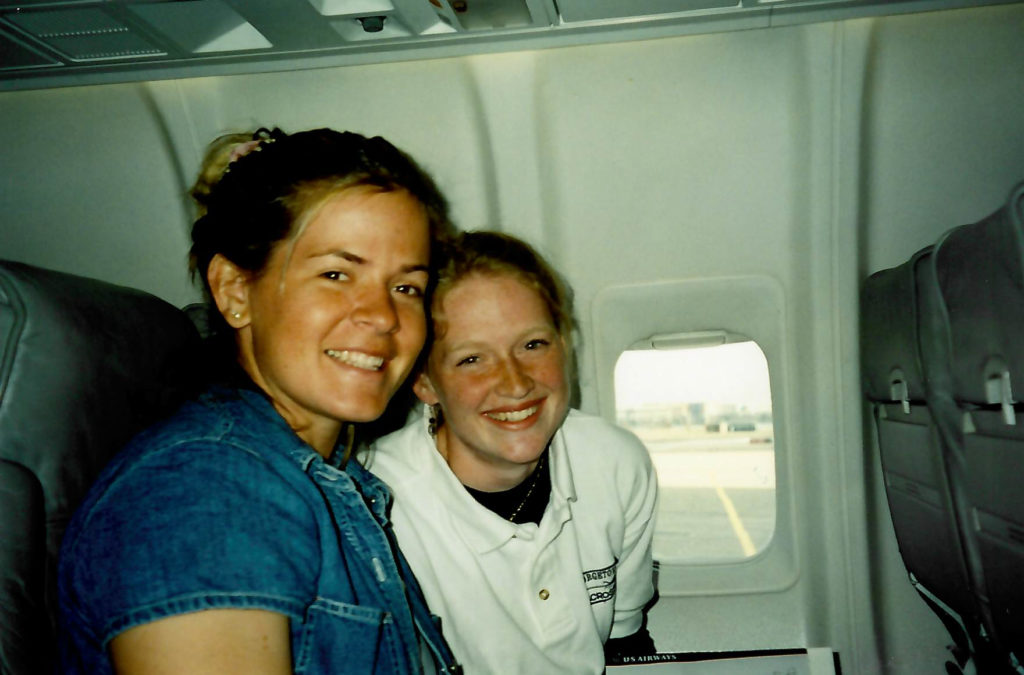
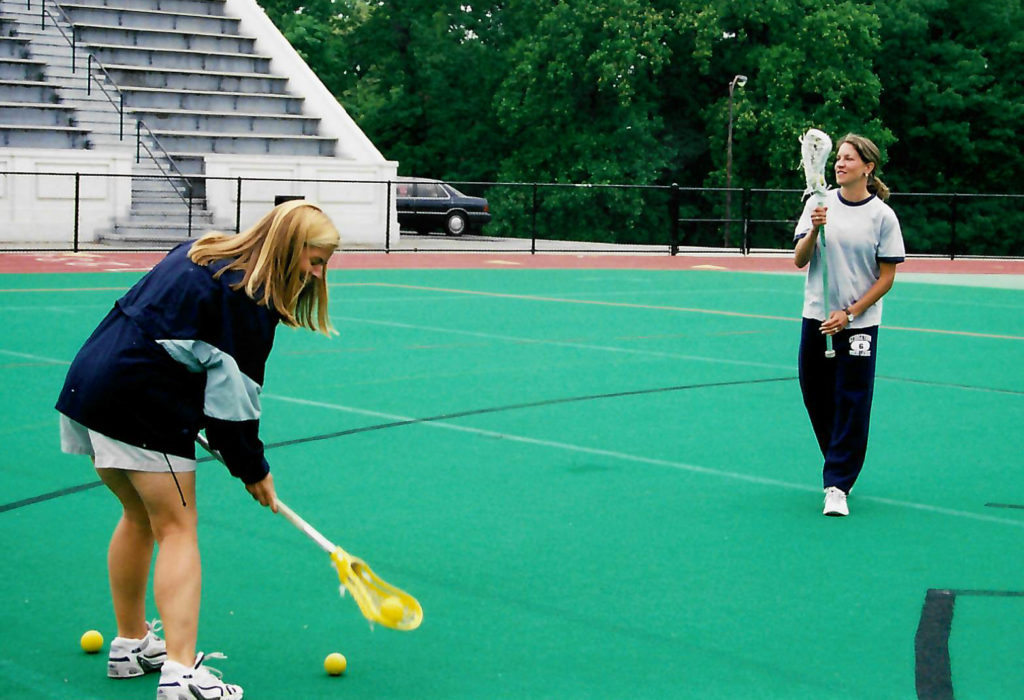
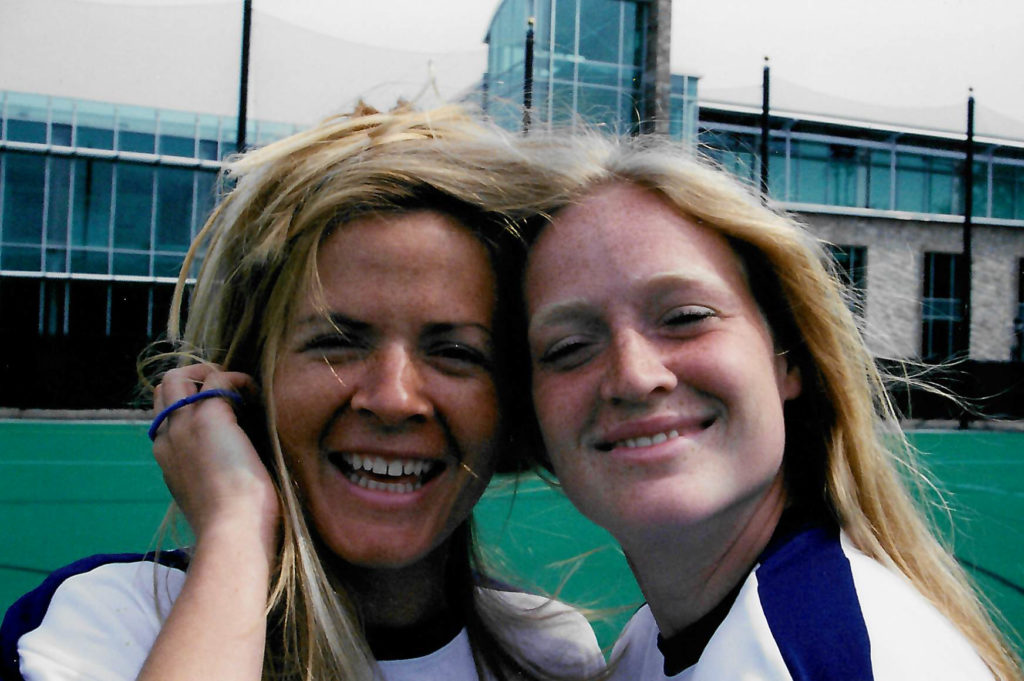
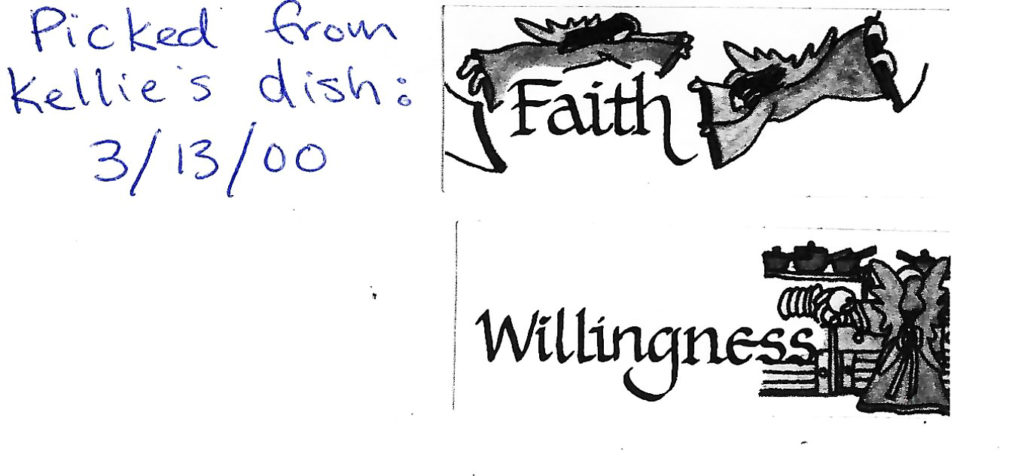
I never questioned my role from that point on. I still put forth the same effort, but I no longer viewed the backup spot as a lesser position or a sign of failure. I had faith that I was exactly where I was meant to be, being used in the capacity where I could be of most service and have the most impact on my team’s success. I was also in the spot where I could best facilitate my own growth as a person. And I was willing to do whatever tasks came along with that role—even the damn dishes.
By the time Bowen tore her ACL, I was as prepared as I could have possibly been to step in for her, and I did. When she defied all odds, and modern science for that matter, by returning to the playing field a few weeks later with a knee brace and dogged determination to make it through the season, I happily went back to being an understudy. And when I finally started for good my senior season, she was beside me again as an assistant coach.
As much as I feel Malloch’s words in my own experience, I also see them in Ted Lasso’s. He isn’t the most incredible soccer strategist or the best qualified person for his job, but he shows up every day aspiring to be the best of whatever he is. And whether by example or proximity, his positive spirit and relentless belief in himself and those around him inevitably rub off. He doesn’t measure success in wins and losses but rather in making his players better people—on the pitch and out in the real world. That’s what my teammates and coaches did for me. Hopefully, it’s what I did for them. It’s certainly what Mister Rogers did, too.
And like Mr. Rogers, maybe I also see a little of all of us in flowers. Individually interesting, distinctively endowed, striking because of, not despite, our differences, and each peaking on our own time in assorted seasons. It’s in their diversity that the blooms contrast and complement each other at the same time: nature’s magic trick.
Smells Like Potential
When I met Kim Simons on my recruiting trip in 1997, I couldn’t have known all the ways she would challenge and support me in the coming years. I couldn’t have known that more than two decades later, she would still be a cherished mentor and friend and a lifetime job reference. But I think, even in that first meeting, I recognized the gardener in her. I was ready to sprout, and she was hellbent on growing things.
Seeds are miraculous when you think about it. Everything they will ever become is already hardwired within them. They just need the right environment and a little caretaking to coax it out of them.
Recently, I bought a bunch of seeds from Floret. I don’t own any land. I don’t even have a garden. I have no idea when or how the seeds will be planted. But I trust one day I’ll get them into the soil. I’ll water them as they germinate and establish roots. I’ll wait patiently as they slowly become whatever it is they are meant to be, and I’ll marvel at their progress.
I’m grateful for the tiny seeds of purpose in my own life that were sprouted by curiosity. But more than that, I’m indebted to the gardeners: the literal ones and the green-thumbed growers disguised as teachers, coaches, teammates, friends, and, occasionally, exceptionally crafted, heartfelt television characters who are also technically coaches. They are the ones who see potential—and believe—long before there’s proof.
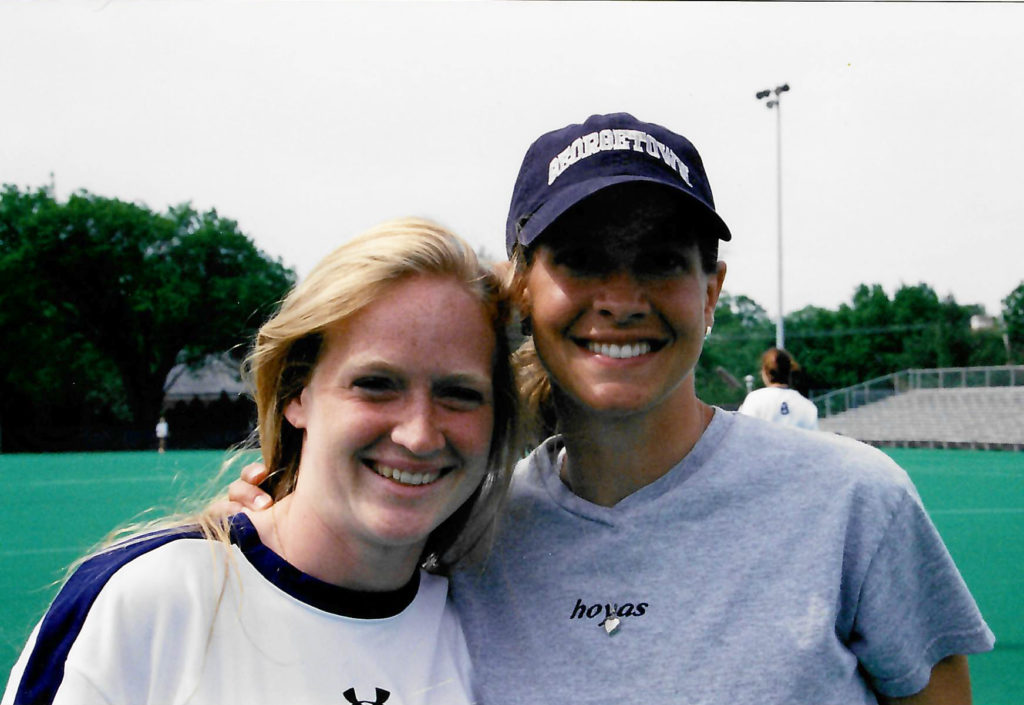
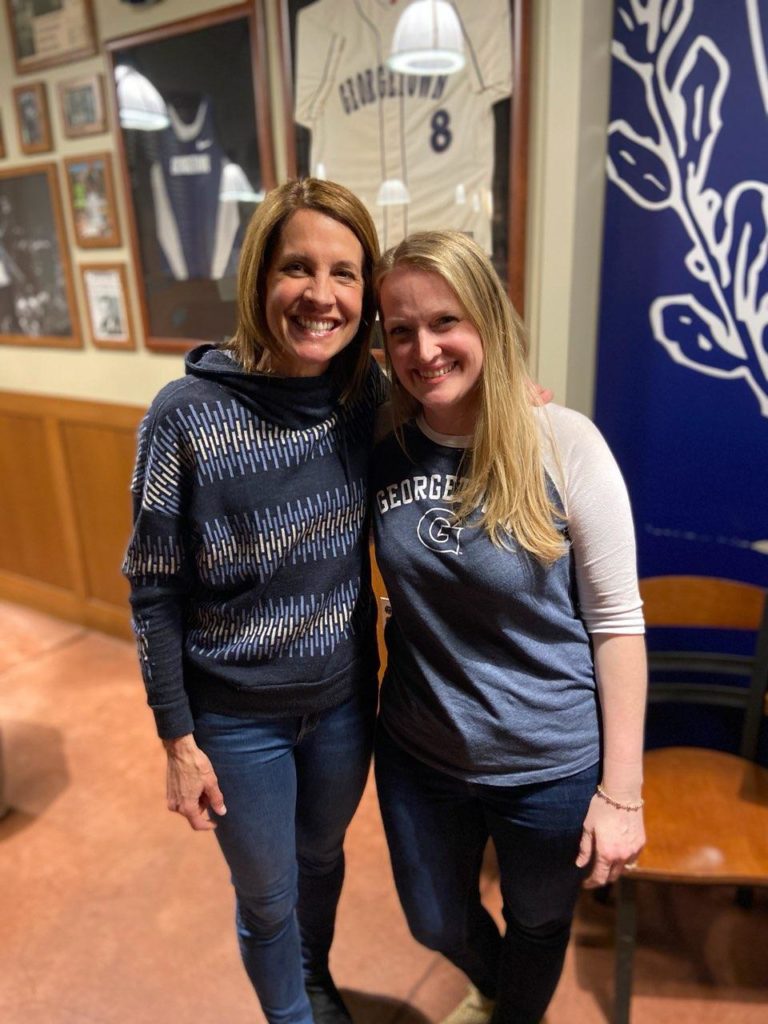
[i] “Community.” Growing Floret. Season 1, Episode 3, Discovery+, 2021.
[ii] “The Hope That Kills You.” Ted Lasso, created by Jason Sudeikis, Brendan Hunt, Bill Lawrence, Joe Kelly. Season 1, Episode 10, AppleTV+, 2020.
[iii] Source: https://www.familyfriendpoems.com/poem/be-the-best-of-whatever-you-are-by-douglas-malloch
[iv] “Diamond Dogs” is a name Ted, Coach Beard, Higgins, and Nate called themselves when they got together to workshop each other’s life problems. They created a safe space (free from judgment and toxic masculinity) in which they could help each other through issues in a healthy, meaningful way.


This is wonderful, Chan!!! You are very talented….love you, Aunt Gale❤️
Thanks, Aunt Gale! 🥰
Love this, Channy-you have a beautiful way with words❤️
Aw, thanks, B! ❤😘
A great read Chandler! Well done, you have talent!!
Gary
Thanks for reading! I appreciate it.
Love this!❤️ You are so talented with your journalistic ability and you ARE a florist! Love you.
Thanks, Aunt Sue! 😘🥰
Keep writing Chandler!!
Your love of life is inspiring!
Good storytelling, like flowers, illicit joy in your readers. It’s a gift that is meant to be shared!
Thank you! Hoping someone will get joy from it is usually what convinces me to hit the publish button.
Chandler-
I love reading everything g you write! It makes me laugh, think, reflect I genuinely feel joy while I am reading what you write, it fills me with nostalgia. (You capture Kim brilliantly) The saddest part is the reminder you went to Georgetown the year after I graduated.
Please keep posting stories and please keep being unapologetically you!!!
Cheers
Chris
Chandler-
I love reading everything g you write! It makes me laugh, think, reflect I genuinely feel joy while I am reading what you write, it fills me with nostalgia. (You capture Kim brilliantly) The saddest part is the reminder you went to Georgetown the year after I graduated.
Please keep posting stories and please keep being unapologetically you!!!
Chris
Thank you, Chris. That means a lot. And even though we didn’t overlap, I still feel like I got a bonus teammate out of it. Better late than never. 😉
Chan-
As a college coach myself now, this resonated so deeply with me! Thank you for sharing your wonderful perspective on some of the most difficult experiences for all parties involved. Your words will help reshape the mindset around setbacks and disappointment to a place of growth, self discovery and strength. Please keep writing, you are brilliant and have a beautiful gift in expressing vulnerability in the most relatable way to make others feel not alone in their own journeys. Reading this absolutely was the highlight of my day. Feeling very thankful to know such a special person like you! <3 -MK
Hey, Meghan! I’m so glad it resonated with you, and thank you so much for the heartfelt response. It was a lovely surprise to see your name pop up. Keep up the good work, Coach! XO
Chan
A terrific read, you are extremely talented in expressing your journeys of life and how they molded you. Although you come from good stock. Go out and live to the fullest
My Best
Mr Ed
Thanks, Mr. Ed!
Enjoyed reading your story. You have a strength that “team play” you learn from playing sports. A winning altitude with we will do better next time. A softer side shows up in flower arrangements. Quite beautiful. Hard hitting agressive lacrosse player with a soft Mr Roger’s side who loves beautiful flowers and the art of arrangements. Great combination.
A friend of the family.
A great read to start my day. Much thanks!
You’re welcome—and thanks so much for taking the time to read it.
Chandler,
I certainly hope that you are considering writing a book. You are an exceptional talent! Your life experiences and successes are impressive. Keep at it! I look forward to hearing more.
Steve Davis
Thank you—I really appreciate it. And a book is on the bucket list for sure!